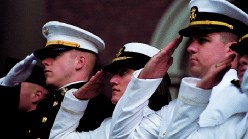Speaking with students, Summers has called military service "noble" and said, "We need to be careful about adopting any policy on campus of nonsupport for those involved in defending the country." In a Veterans Day letter to Harvard cadets and midshipmen, he wrote that he "and many others deeply admire those of you who choose to serve society in this way." He asked editors of the Harvard Yearbook to allow students to list ROTC among their activities, which they could not previously do because ROTC is not an officially sanctioned activity.
 |
| A commissioning ceremony for Harvard ROTC students occurs each June in Harvard Yard. |
| Photograph by Jim Harrison |
In a speech at the Kennedy School, Summers said that "if these terrible events and the struggle that we are now engaged in once again re-ignite our sense of patriotismre-ignite our respect for those who wear uniformsand bring us together as a country in that way, it will be no small thing."
Speaking to the Faculty of Arts and Sciences (FAS), Summers described military service as "vitally important to the freedom that makes possible institutions like Harvard." Given the long history of debate about ROTC at the University, he said, "I have begun to acquaint myself with the record of faculty" discussion and decisions, mindful of Harvard's commitments both to nondiscrimination and to the imperative of national service at a time of war.
FAS banished the Reserve Officers' Training Corps in 1969 during the Vietnam War. Harvard students could continue to participate in ROTC, but they had to train with the ROTC program at MIT. Harvard made payments to MIT to cover the administrative costs of training its students until 1993, when it stopped doing even that on the grounds that the ban on homosexuals in the military violated the University's nondiscrimination policy. At the time, Harvard president Neil L. Rudenstine, with the knowledge of the faculty, set up with a local law firm a channel through which administrative costs could be paid by alumni donors, not by Harvard. Since then, the annual costs of about $135,000 have been met by two or three anonymous donors.
At the Harvard Club of Boston's annual meeting on March 26, Summers called the present funding arrangement for ROTC an "uncomfortable compromise," echoing comments he made earlier to students. Yet he has not so far indicated that he has decided to change Harvard's financial or administrative policies toward ROTC. And the military's policies about homosexuality have not changed.
The members of Advocates for Harvard ROTC, an organization founded in 1988, have been energized by events and by Summers's statements. The group now has 1,060 Harvard affiliates signed on, and the number is growing.
The Advocates for Harvard ROTC seek "the complete acceptance of ROTC by Harvard," says David Clayman '38, the founder and chair of the group, which issued its first newsletter in the fall. "We want ROTC to be respected by the College. It isn't about money, although the present arrangement is clumsy and awkward. It's a symbolic matter." Clayman, now retired, never in uniform himself, taught meteorology and celestial navigation as a civilian instructor in the navy in World War II.
Clayman met with Summers in early February to present the group's petition that Harvard officially recognize ROTC. "He listened very carefully to what we had to say," says Clayman.
Michael M. Segal '76, M.D., assistant professor of neurosurgery, has never had a military connection, but wants to support ROTC. He maintains an informative website for the advocates, at www.segal.org/rotc/.
"We are exploring a number of different ways of enriching the ROTC experience at Harvard," says Segal. "For instance, we have taken steps to bring cadets together with the National Security Fellowsmid-career military people spending a year at the Kennedy Schoolwho might act as mentors to cadets. We want to make the ROTC experience attractive enough so that a prospective cadet would say, "I'd like to go to Harvard."





